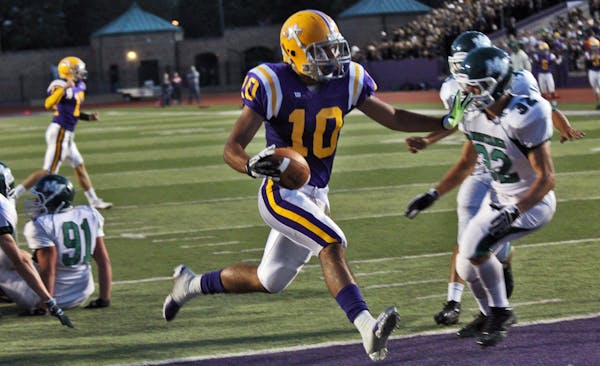It's difficult to say which side effect of his profession Jerry Kill loathes more: losing football games or talking about seizures. Which makes last weekend doubly dreadful.
Kill was released from a suburban Minneapolis hospital Sunday morning, roughly 14 hours after he suffered a seizure at TCF Bank Stadium following the Gophers' 21-13 loss to Northwestern. The seizure was far less severe than the one that occurred in front of fans during a game 13 months ago, defensive coordinator Tracy Claeys said, and Kill was expected back at work on Monday -- though "it wouldn't surprise me," Claeys said, if he came to the office Sunday to pore over video of that loss.
Kill's relapse focuses attention once more on his decades-old disorder, which the coach regards as almost as irritating as the seizures themselves. So Claeys on Sunday downplayed the disruption that they cause, emphasizing that Kill's veteran staff carries on as though he was there.
"He wishes it wasn't public, because it doesn't affect how we do things, how we prepare. Without a doubt, that's the most frustrating thing to him," Claeys said. "Other people don't have such a public job, but they live with it and do their jobs. It just so happens during the season, it's more public. ... I don't mean to [say] it's all so ho-hum, but there are a lot of people who live with it."
Kill is one of them, and after being examined in the hospital this weekend, "all tests confirm that he remains in excellent health," team physician Dr. Pat Smith said in a statement released by the university on Sunday. Claeys said he was told that Kill's seizure was relatively minor, nothing he hasn't experienced in the past. In fact, had he not been in such a public setting, it may not have even required hospitalization.
"If this had happened 30 minutes later at home, there's no big deal about it," Claeys said. "But when it happens [at the stadium], you have no choice but to get an ambulance and get him to the hospital."
The seizure occurred in Kill's private locker room less than an hour after the game ended, shortly after he finished his normal series of postgame interviews. No players witnessed the seizure, but they were informed via text message of his condition Saturday evening, and of his release the next morning. Sunday's conditioning sessions went on as normal.
Kill has lent his name and his time to epilepsy charities, in hopes of removing the stigma for people who share his condition, but he's also reluctant to discuss the seizures at length for professional reasons. The fallout from last year's episode, in full view of a stadium of football fans, included Internet speculation about his fitness for his job, and Kill's staff believes competing programs use uninformed diagnoses to scare recruits away from Minnesota. No player has ever cited it as a reason for choosing another school, he said, but some have told Kill that other recruiters bring it up.
"It says a lot about character if somebody uses that against you," Claeys said. "Everybody knows negative recruiting goes on, but when you attack somebody's health, when you don't know what's going on," it's ethically corrupt, he said.
As for Kill's job status, Claeys said, just look at his staff, eight members of whom have worked for the coach for more than a decade.
"If you worked for a coach and you were worried about [his health] being career-threatening, everybody would be leaving," Claeys said. "I'm just being honest -- you'd go get a job working for someone else. We've known about it here, and there's not one guy that's left the staff because of it. We feel very comfortable with it."
